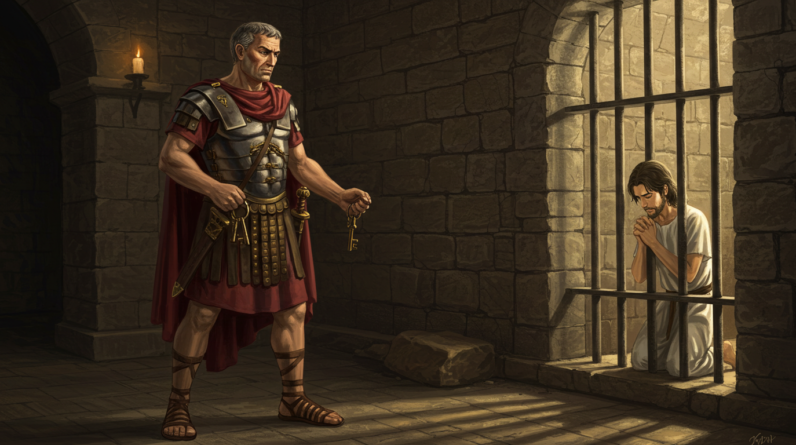Discover the heartwarming tale of the thief on the cross, exploring themes of redemption, faith, and divine grace in a story of last-minute transformation.
Before we dive into the heartwarming tale of redemption of the thief on the cross, let’s take a moment to understand who he was before his sudden turn of faith. In a time when the Roman Empire held a tight grip over the people, thievery was considered a serious crime, punishable by death. The man we know simply as the “thief on the cross” was not an isolated evildoer; he represented the countless individuals who found themselves trapped in a life of crime, either by choice or circumstance. But whoever he was before this defining moment, he was initially an opponent to Jesus.
We can imagine that, like many, he was skeptical of Jesus’ claims and teachings. Perhaps, at some point, he might have mocked the stories of miracles he heard from passersby. Or maybe he’d witnessed them and still held doubt. Regardless, we know from the accounts around the crucifixion that at least one of the criminals crucified alongside Jesus hurled insults at him, questioning his Messianic identity and challenging Him to save them all if He was truly the Christ (Luke 23:39).
In a world where divine intervention seemed a distant dream, the thief’s heart, burdened with sin and skepticism, found itself adjacent to salvation in the most unlikely of places: on a cross.
The Encounter
The scene was grim. Golgotha, or “the place of the skull”, was not only an execution ground but also a gathering place for mockery and public shaming. Jesus was crucified between two criminals, a position that further emphasized the disdain the society had for what they called His blasphemous claims. The air was thick with taunts, jeers, and the clinking sounds of dice being rolled for His garments. In this chaos, one voice stood distinct amidst the noise, a voice that wasn’t deriding but defending.
It was the voice of the thief rebuking his fellow criminal. His declaration is significant in its simplicity: “Don’t you fear God,” he asked, “since you are under the same sentence?” (Luke 23:40). His awareness of the divine presence beside him marked the beginning of a transformative understanding. He acknowledged their shared guilt and the righteousness of their punishment, saying, “We are punished justly, for we are getting what our deeds deserve. But this man has done nothing wrong” (Luke 23:41).
In that moment of profound realization amid despair, the thief addressed Jesus directly. “Jesus, remember me when you come into your kingdom,” he pleaded (Luke 23:42). It wasn’t merely a cry for help; it was an expression of faith. Despite his life of sin and the dire consequences he faced, he saw beyond Jesus’ bloodied and frail frame; he saw a king.
The Turning Point
What possessed this man to suddenly become a believer, to transition from a life lived apart from divine grace to recognition of Jesus as Lord? Perhaps it was the compassion he witnessed in Jesus’ demeanor, even as He hung dying on the cross. Jesus’ words amidst His suffering, pleading for the forgiveness of His executioners — “Father, forgive them, for they do not know what they are doing” (Luke 23:34) — might have pierced through the thief’s hardened heart.
There was a tangible purity in Jesus’ suffering, a stoicism that understood His role within a greater divine narrative. The thief, watching the serenity of Jesus amid the brutality, may have understood that Jesus’ kingdom was not of this world. This comprehension shifted his perspective, prompting a plea not for physical rescue from the cross, but for eternal recognition and life beyond the grave.
The Outcome
To the thief’s astonishing request, Jesus’ reply was both immediate and astonishing: “Truly I tell you, today you will be with me in paradise” (Luke 23:43). These words were a promise not just of an afterlife, but of redemption, of unmerited forgiveness and grace. Despite a lifetime lived in opposition to God’s laws, despite not having the opportunity to be baptized or lead a life of faith, the thief was welcomed into the Kingdom.
Though there are no more records of the thief beyond this pivotal moment, his story reverberates through the Christian faith. His encounter with Jesus serves as a powerful statement about the efficacy of God’s grace — that it is never too late to turn to God, and that salvation is accessible to all, irrespective of past misdeeds.

Key Lessons
What does the thief’s redemption teach us? In the grand tapestry of faith, three lessons stand out:
- The Power of Repentance: The thief’s recognition of his guilt and his plea for Jesus’ remembrance underscore the transformative power of repentance. His story encourages all that no one is too far gone for God’s love.
- Faith over Ritual: The thief’s lack of formal religious rituals contrasts sharply against his simple yet sincere faith. In his brief but profound example, we learn that the essence of faith is not found in rituals, but in belief and acknowledgment of Christ.
- God’s Grace Knows No Bounds: The thief’s story is a testament to the boundless nature of divine grace. It’s a reminder that grace is available until the last breath and is not determined by human standards but by divine mercy.
The story of the thief on the cross is not just a tale of last-minute redemption; it’s a profound illustration of God’s kingdom, where the first will be last, and the last will be first. It’s a reminder for all of us, no matter where we are in life or what crosses we bear, that hope and transformation remain within reach.







